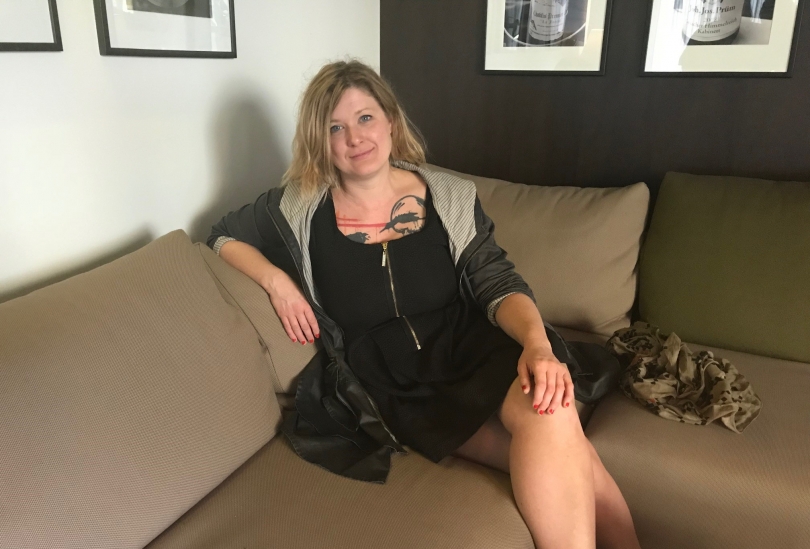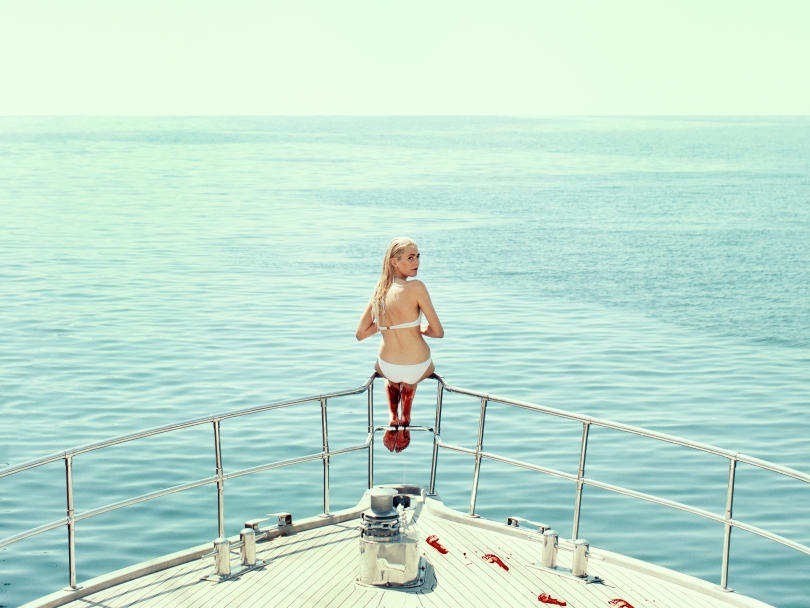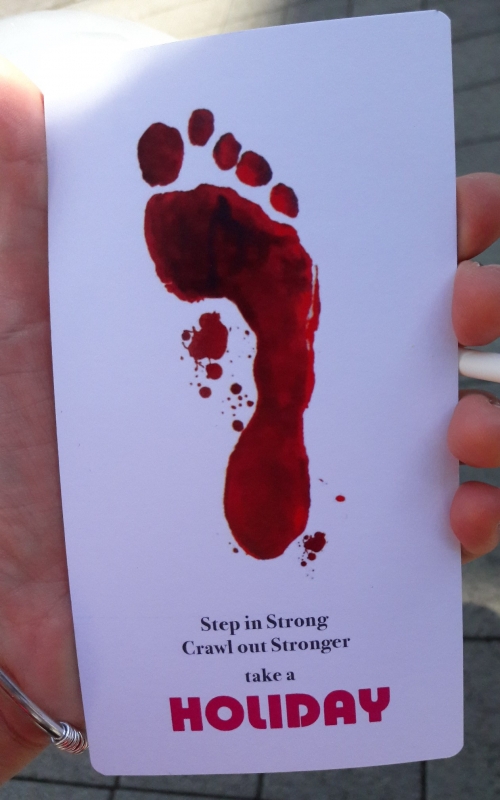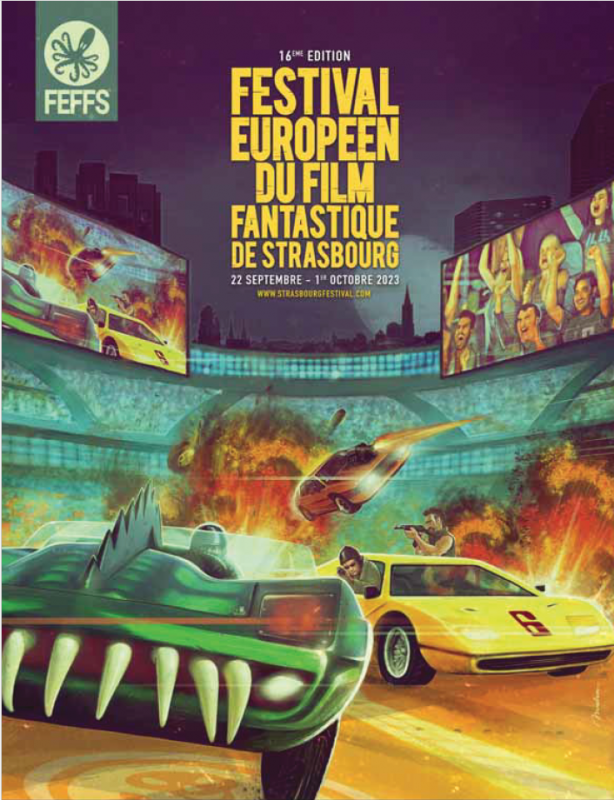|
|
||
|
Pro Tools
FILMFESTIVALS | 24/7 world wide coverageWelcome ! Enjoy the best of both worlds: Film & Festival News, exploring the best of the film festivals community. Launched in 1995, relentlessly connecting films to festivals, documenting and promoting festivals worldwide. We are sorry for this ongoing disruption. We are working on it. Please Do Not Publish until this message disappears. For collaboration, editorial contributions, or publicity, please send us an email here. User login |
Strasbourg European Fantastic Film Festival
The Strasbourg European Fantastic Film Festival was founded in 2008 by Les Films du Spectre and today is one of the most comprehensive genre events in France. Dedicated to broadly-defined fantastic cinema – fantasy, horror, sci-fi, thrillers, animation and so forth – it has never ceased to innovate. The Festival has become a major platform for eclectic programming that includes independent, auteur, and studio films, documentaries, and heritage revivals, to name but a few, drawing a diverse range of audiences. The Festival showcases both new talent and established directors, and other industry professionals of genre cinema. Past guests include Lamberto Bava, Catherine Breillat, Marina De Van, Ruggero Deodato, Lucky Mckee, Agnès Merlet, Caroline Munro, Philippe Nahon, Brian Yuzna, Roger Corman, Edith Scob, George Romero and Mick Garris. The Festival also offers many side events, further attracting different publics: one of the largest zombie walks in Europe with 3 500 participants, master classes, the Fantastic Village, children’s workshops, conferences, exhibitions, book and posters signings and so forth. THE SEFFF PHOTO GALLERY BY BRUNO CHATELIN I DAILIES: ENGLISH FRENCH I STRASBOURGFESTIVAL.COM  Interview - Isabella Eklöf's striking debut film "Holiday" by Lyndsay Bellinger
By LINDSAY R. BELLINGER
"Holiday" is Swedish director Isabella Eklöf's feature directorial debut but one would never know it. Her film has been catching audiences off-guard since its premiere at Sundance Film Festival at the beginning of this year. The one very graphic and unwavering depiction of rape, the kind of rape that happens more often than naught by someone the victim knows, has surely been causing much of the stir. Yet there are still so many other wonderful moments within the film that deserve recognition, outside of this one violent/horrific scene. Not to say that the rape scene is any less shocking because it is, possibly even more so than Gaspar Noé's depiction in "Irreversible" which was also an uninterrupted long take but perpetrated by a stranger. The audience really is brought into the room, feels uncomfortable as a voyeur but can't look away.

It's a true international production, Swedish-born Eklöf shot on-location on the Turkish Riviera with mainly a Danish, Dutch and Turkish cast and crew. Eklöf doesn't seem to mind working in a variety of languages, in locations outside of Scandinavia. Her filmmaking is courageous, it shows someone who is not afraid of crossing boundaries, rather hitting them head-on. She definitely pushes beyond viewer's expectations.

Lyndsay saw the film at The Oldenburg Film Festival which clearly recognized Eklöf's bravado, even bestowing "Holiday" as the theme for the secret Saturday night party, the invitations which were even modeled after her poster design. Swedish singer Jerry Williams' cover of the old African American gospel song "Sinnerman", made famous by Nina Simone in 1965, is an unexpected touch that gives one chills. I had the chance to talk with Isabella Eklöf about her film and how she hopes that it gets wider distribution, despite the social taboos that she has dared to break.
I really enjoyed your film, as did the audience here in Oldenburg. After the initial dance sequence it was a slow ride, but full of little surprises that crept up on you without any real explanations tied to them. It felt like observing the normal life of a young woman who was on holiday with friends some of who happen to be gangsters. Are you a fan of the gangster genre? How did you get involved with this story?
Isabella Eklöf: Not at all, I find them very boring. I don't feel that it's a gangster film at all. It's just a film about a girl in a certain circumstance.
Sascha's circumstances felt very real, with a natural pace to them. It didn't feel that staged or forced.
IE: It's a very realistic world. It's very close to home. It's how a lot of the Danish lower classes are, a lot of the lower classes in Copenhagen. The hash trade is enormous there. Copenhagen is kind of a hub in Northern Europe so it's kind of a part of the whole Danish economy.
Interesting. What exactly is your connection to Denmark? You were born in Sweden but your main protagonist Sascha (Victoria Carmen Sonne) and many of the supporting cast are Danish. Did you also grow up in Denmark?
IE: No, no not at all. I just came there for the film school. It's just a great, great film school. Maybe the best film school in the world. Or at least it was when I went there. They're doing changes, so maybe they're not that good anymore. Everything has it's time.
It sounds like you had quite a bit of experience, having done 11 short films and working on other feature films. Are your shorts also so dark, with a similar tone to "Holiday"?
IE: Yeah, I suppose they are. I'm trying to start to think back, what pops up. It's always often kind of a slow burn. And it's often about women powerless...powerless and then hitting their head against the wall again and again and again.
Your short film from 2011 "Notes from Underground" was about pedophilia, which is quite a heavy and not-often-touched upon topic. Can you discuss your choice to cover that subject matter?
IE: Well, I actually read Sabine Dardenne's book "I Choose to Live". And she was kidnapped by Marc Dutroux, the Belgian murderer in the 90s. She was one of six girls taken, two girls survived. She wrote a wonderfully heartbreaking book about it. It's a lot about what I call the grayness of evil or drabness of evil. How evil is sort of usually something that goes on over time, it's not something that jumps out of the bushes at night. It's something every day, a little more grinding you down. And that's what I wanted to show in this (short) film because generally with sexual violence people have a tendency to, especially guys I think, have a tendency to think that it's some stranger in the dark.
Right, that's the myth that's perpetuated.
IE: Well, it's getting better but it used to be like that. And of course it's not; it's your best friend after a party.
Yeah, the majority of sexual violence experienced by women or men are perpetuated by people they know, family, friends, acquaintances.
IE: People they trust.
Yeah, and that's why I found the rape scene more disturbing and emotional. The first two sex scenes where one was consensual and the other one we're not sure what happens, you chose to move the camera, not showing the intimate details. That made me wonder whether or not you were shying away from showing us explicit sex scenes because you're a female filmmaker. I mean, on-screen we get so bombarded with an endless amount of T&A, especially shown through a male director's gaze. So your scene felt so realistic, starting out playful and then taking a sudden turn for the worse. Like when the Michael character licked his palm twice before forcing himself on Sascha. You rarely, if ever, see a detail like that in film. Can you discuss that scene? How did you decide to shoot in that long, uninterrupted take?
IE: Well, it's not that calculated really. It's all about what feels right and I had something about showing an erect cock. I think it's strange. I mean, yeah we know that women have been fetishized and objectified for a long time and it's actually sort of funny that it should still be shocking to objectify the male body. And an erect cock is very beautiful, very sexy and I think that it's funny that it should be taboo. I'm very much a fan of Lars von Trier's attempts to break those boundaries. And I actually worked with him as a VFX artist...in trying to show the body without of course breaking anybody's integrity.
So are you saying that there were no prosthetics?
IE: It is a prosthetic. When I mean show the body, I mean to the audience, to talk about the human body. But that doesn't mean that we have to show real people's bodies. Because of course there is an element of privacy there.
Yes, of course. And making the actors comfortable with what you are asking them to do on-screen.
So, you co-wrote the script with Johanne Algren. How did you two team up to get this film made?
IE: The film actually started with a producer who came to me with one of Johanne's books. So we started writing a script based on that book. We sort of deviated from the book. And so it has no real connection to the plot in the book but it does have sort of the same protagonist who is very much Johanne herself, much of the same issues with these sexy, powerful men.
It feels so real. How authentic is this story?
IE: It's very much based on lived experiences, her (Johanne) experiences. I know a little bit about a world that's connected to that world. I know a bit about the world of the nouveau riche, the upcomers. And they're shady as well. There's a gray area and a lot of it has to do with property and estates. And the construction business is very corrupt. So there is a lot of money laundering going on there. There is that overlap between the drug, weapons and women, salesmen and the others. Yeah, so they work together.
The lead actress Victoria Carmen Sonne was impressive. She started out a bit naive early-on and eventually ended up claiming her own agency, all the while subtly allowing her story to unfold on camera. How did you find her for the role of Sascha?
IE: That's actually interesting because Victoria was suggested by the caster, and I was kind of dismissive and annoyed because I had specifically asked for someone over thirty. And she kept saying, "Try her out, try her out." And I just really didn't want to and I tried her for another part, the part of Tanya. And somehow because she had already read they sort of convinced me to do the scene with her anyway. And I'm glad that they did because I seriously don't think that there is another actress in Denmark who could do a part, which demands that you have some sort of experience with these extremes. Actors have to have some kind of experience to understand certain emotions. And she has that but she is also super intelligent. And there are quite a few Danish actresses who have the lived experience but not the intelligence. And there are a lot of talented, bright actresses who are so upper-middle class so they don't have the experience. So Victoria was the only one who I could find who had both.
She was the perfect balance, the perfect Sascha. It definitely worked with her as Sascha, and I can't even imagine another actress who could take on that role, maybe a younger Jennifer Jason Leigh. Why exactly did you specifically ask for actresses who are over thirty?
IE: I didn't want it to become a coming of age story. I wanted it not to be a story about this young, ditzy girl who is in trouble. I mean, when you are young you can do all the mistakes that you want and it doesn't matter at all because you can bounce back. But at a certain age the decisions you make are final. That's what I wanted it to be about but I think it worked out anyway.
It sure did. No complaints here. After you found your perfect cast with Victoria Carmen Sonne in the lead role, how did rehearsals start out?
IE: We didn't have too many rehearsals. We worked a little bit in the black box (theater) two or three days. Just going over the scenes two or three times. Mostly just talking about it. I don't want to rehearse too much. I'm trying to get a sense of being there for the first time. Black box working I find is very nice because you can digest things and talk about things and then sort of forget them and then live through them on sets. It's as if it's the first time because you're in a new setting but you still have your body movements for what you're supposed to be going through.
I loved the pop of the film, the vibrant colors and the almost blindingly bright lighting in the beach environment. Can you talk a little about your collaborative process with cinematographer Nadim Carlsen?
IE: We have very much the same tastes. But he is a very versatile cinematographer. He has worked with a lot of different directors, different looks and he's always performs. He's really, really talented. We have a lot in common. Like we like the same still photographers, we like the same cinematographers. And he knows what I like. We both like Ulrich Seidl very much. We both like Harmony Korine. That kind of looking at the world, stylizing the world but looking at the world as very real. I'm a little more conservative. Nadim is developing because he's always shooting so many different things so he's pushing me a little bit. Seidl started using more color with the Paradise Trilogy, and so I started using more color as well. If you look at "Notes from Underground" my pedophile film, it's very pastel, very subdued color palette. No contrast at all. In this film still no contrast but just a lot of color. And I think one thing that gives it a unique look is that it's shot in Turkey but the tint is kind of bluish, which makes it pop. And it's not conventional. The convention is to make a movie yellowish when you're in a sunny place so that's one reason why we get these very vibrant colors. More blue, which is very Swedish of me.
Really, how is that?
IE: We actually do tint our movies more blue. Northern Europe films are bluer than everywhere else. And actually I heard somewhere it actually goes all the way back to a lab in the 40s that had the chemicals wrong. And there is also something with Fuji and Kodak in the days when one of them is more yellow and one more blue and the preference of which one you took is sort of regional. So of course when the sun is out like that it makes more yellow light so you have to tint it to make it more blue. And in Sweden we don't really see the sun a lot but there is often a big brightness like the sky is all white so there is a really big soft light.
I was really drawn to your two posters, the one with Sascha sitting on the bow of the boat with bloody feet and footprints and also the one with her standing almost model-like in a pool of blood with bloody fingers. They are very eye-catching and startling. I bet if one looks at them quickly in passing they might not even notice the blood. How involved were you with choosing those posters?
IE: Oh, I shot them, not physically but I designed them. I was painting the blood on the feet. I have this thing that I do when I develop a movie, I think of the poster really early and I just stick to it. Because it's sort of a way of summarizing the essence of the film to yourself and sticking to it.
And the posters really capture the film so well. Your film premiered at Sundance earlier this year. That's a huge feat. How have the reactions been at the festivals?
IE: Very positive. A lot of people who see it and want to talk about it. A lot of people who tell me that they are lying awake or they can't sleep or they are dreaming about it. It's kind of in the linger department. I think that part of the reason is that it's shot so openly. You know that the convention for many years has been to close on the face too much in my opinion. Because the face is just a face and you're going to get your emotions through projecting anyway so I try to zoom out so we can look at the society we're in, the environment within. Because when we go too close we tend to rely on these five basic emotions and we go on a roller coaster ride and there's no substance really.
Then you're trying to lead the audience too much. Feel this.
IE: Feel this, feel that and then afterwards you're empty because there's nothing else to it.
How are the distribution opportunities looking so far?
IE: Not good.
Really?
IE: No, it's the cock. It's okay. That's the price you pay for pushing boundaries. I don't mind. I wasn't anticipating this success at all and I wasn't anticipating distribution abroad. I'm not interested in industry. Of course it pays the bills, so I have to be but I'm not doing this to gain points in some numbers game. So we have Sweden, Denmark, The Netherlands, Spain, Japan, maybe The US, and one more I think. It's alright but it could be better.
Do you have any new projects that you are already working on? Anything that you feel like sharing?
IE: Yeah, too many. I'm the girl who couldn't say no. I have many things that I could share but it would be a long day. For example, I'm very much looking forward to going to Torino Film Labs. After this I go to Strasbourg Film Festival and then to Torino. I'm gonna work together with a Danish author Kim Leine. He wrote a bestseller called "Kalak". It's a Greenlandic word meaning dirty Greenlander. And it's about a Danish guy who goes to Greenland starting to work as a nurse and fucks up, and spirals down. Sex abuse and drug abuse, and it's a true story. The author's own story. I'm actually working with him exactly how I did with Johanne. I'm using the book but actually I'm talking about the world more than the actual book, trying to pull out more stories from him and put together my own construction about his story.
"Kalak" sounds like another story that might do well if screened at Oldenburg. If you had to sum up your experience in Oldenburg in three words, what would they be?
Oldenburg is friendly, party and small...in the best of senses. You actually hang with the director of the festival, you actually hang with the celebrities who come.
It's not pretentious at all like some other festivals.
No, not at all. It's really nice.
Can you pick three words to describe your experience with "Holiday"?
Enriching. I learned so much. And that's part of the reason that I do it. I mean, you're a gangster girl oooooh, let's dive into that and see everything about it. That is a hard one. Empowering, it's my first feature of course. It's nice to be the boss. You have a lot of ideas and a lot of things you want to do.
I guess also frustrating. No, that's not even right because there are a lot of frustrations but they are so minor in comparison.
So what's the third? I guess bright. Bright is a good word. Like my intention is to lift the carpet and to shine a light under the carpet. I feel like that happened at the shoot. The light was so bright all the time. Clarity is maybe a better word. In my life things become clearer when you are on the right path.
Denmark / Netherlands / Sweden 2018 Director: Isabella Eklöf Screenwriters: Isabella Eklöf, Johanne Algren Cast: Victoria Carmen Sonne, Lai Yde, Thijs Römer Producer: David B. Sorensen Cinematographer: Nadim Carlsen Editor: Olivia Neergaard-Holm Music: Martin Dirkov Isabella Eklöf's representation: Indio Management 92 Min. | OmeU | Danish, Dutch with English Subtitles
20.09.2018 | Strasbourg European Fantastic Film Festival's blog Cat. : PEOPLE |
LinksThe Bulletin Board > The Bulletin Board Blog Following News Interview with EFM (Berlin) Director
Interview with IFTA Chairman (AFM)
Interview with Cannes Marche du Film Director
Filmfestivals.com dailies live coverage from > Live from India
Useful links for the indies: > Big files transfer
+ SUBSCRIBE to the weekly Newsletter DealsAbout Strasbourg European Fantastic Film Festival Take a browse through these pages to find details of other special screenings and events (...)... See http://www.spectrefilm.com View my profile Send me a message The EditorUser contributions |






















